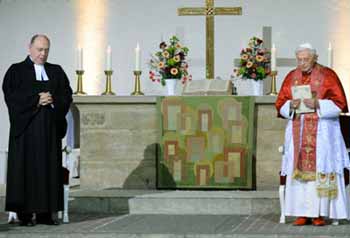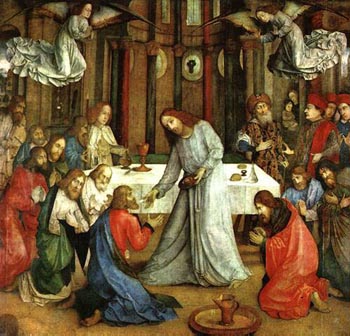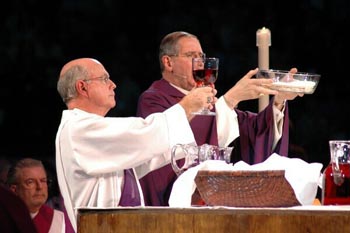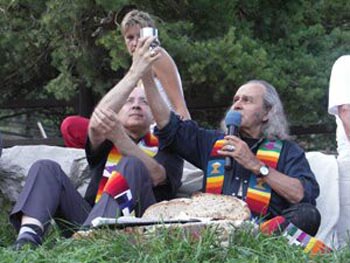 |
Traditionalist Issues
Mysterium Fidei
Prof. Remi Amelunxen
Since the new English translation of the Novus Ordo has just been applied, I want to address the necessity of the words mysterium fidei to validate the consecratory formula of the wine, that is, to change the wine into the Precious Blood of Our Lord Jesus Christ.
With the Liturgical Reform of Paul VI in the wake of Vatican II and principally with the introduction of the Novus Ordo Missae (1969-1970) and its use for more than 40 years, Paul VI and his successors have liberalized the tradition of the Mass and liturgy with the clear aim of making the Catholic Church more akin to the followers of the Protestant heresy. The Protestants do not accept the Mass as a propitiatory sacrifice, but only as a memorial of the Passion. They also reject the transubstantiation; they consider Eucharist to be only a commemorative banquet.

Benedict XVI praises Martin Luther in the Protestant service at the Erfurt monastery |
Thus, the changes in the Paul VI Mass followed these two guidelines. If someone wants to know if corrections introduced to those changes are right, check to see if they restore these two points: propitiatory sacrifice and transubstantiation.
Along with the changes in the Mass, we have seen the countless eulogies of Protestants by Popes during this post-Vatican II period, such as, in the present pontificate, the declaration by Benedict XVI that Brother Schutz of Taize entered heaven as soon as he died, and his praise of Martin Luther last year when he visited the monastery in Erfurt where the heresiarch studied as a priest.
Basics on transubstantiation
A preliminary question that rises as a result of the changes to the liturgy is this: Does the elimination of both pro multis and mysterium fidei - words pronounced by Christ Himself at the Last Supper (1) - invalidate the consecratory formula of the Precious Blood of Jesus? As every Catholic knows, for a sacrament to be valid, it needs to have a valid minister, executing it in union of intention with the Church, using the correct matter and employing the established formula. (2) Thus, the words are necessary to confect the Sacrament of the Eucharist. In the Roman Rite, the formulae have always been the same until the Novus Ordo Missae was thrust upon us in 1969-1970.

Our Lord distributing the Eucharist for the first time |
It is clearly stated at the Council of Florence in the Bull Cantate Domino by Pope Eugene IV that these words must be present. He affirms: "However, since no explanation was given in the aforesaid decree to the Armenians in respect to the form of the words, which the Holy Roman Church, relying on the teaching and authority of the Apostles Peter and Paul, has always been wont to use in the consecration of the Lord's Body and Blood, we concluded that it should be inserted in this present text.
"It uses this form of words in the consecration of Our Lord's Body and Blood: Hoc est enim Corpus meum. Hic est enim Calix Sanguinis mei, novi et aeterni testamenti: mysterium fidei, qui pro vobis et pro multis effundetur in remissionem peccatorum. (3)
The correct English translation of these words is: "For this is my Body; for this is the Chalice of My Blood of the new and eternal testament, the mystery of faith, which shall be shed for you and for many unto the remission of sins."
The pronouncements of Florence were reiterated and extended at the Council of Trent. (4) Many Popes have confirmed the decisions of these two important councils, e.g. Innocent II, Pius IV, Leo XIII and, principally, St. Pius V in the Bull Quo primum tempore. Pope St. Pius V also restated that any deviation in the forms solemnly established by the Council of Florence invalidates the sacrament. (5) All these papal confirmations during four centuries give the strength of infallibility to this sacramental formula.
Importantly, Trent also stated that for all (pro omnibus) could not be used because only to the elect did Christ's Passion and Death bring forth the fruit of salvation.
The use of for many and not for all is based upon the Apostle Paul when he says:"Christ was offered once to exhaust the sins of many" (Heb 11:28), and also on the words of Our Lord reported in St. John: "I pray for them; I pray not for the world but for those whom Thou has given me, because they are Thine" (Jo 17:9).
In the New Mass in the formula of the consecration in the Canon, now called the "Eucharistic prayer," the expression for many was replaced by for all. One of the allegations was that for many would favor a wrong idea of predestination. This, of course, is an absurdity. Pro multis is used by Sacred Tradition, Sacred Scripture and the Extraordinary Magisterium of the Church. What more can be said to show that this allegation is false?
The ICEL translations
From the infallible pronouncements cited above, one can only ask if the Novus Ordo original text in Latin and its ICEL version of the consecratory formula for the wine are valid.
Of interest is that after four decades of using the vernacular translation by ICEL with the for all as the formula of the Consecration, for many has been re-introduced as an effort to curb some abuses and bring people back to the Church. It is Benedict's "reform of the reform," which is trying to save the New Mass from a complete shipwreck.

Novelties in the matter and formula of the Eucharist led to questioning its validity |
But the words mysterium fidei, also vital for validity of the Consecration, did not return to the context determined by the Councils of Florence and Trent. Instead, these words were put in a completely different context, in what is now called a memorial acclamation, which reads: "Let us proclaim the mystery of faith: Christ has died. Christ is Risen, and Christ will come again." These words of acclamation have nothing to do with the previous context, in which the mystery of faith referred straightforwardly to the transubstantiation.
Therefore, my question is whether this omission of the sacramental formula invalidates the Mass. It is not an inconsequential question, since in the whole English-speaking world this new formula has been said in the enormous majority of Masses. Were it not valid, Catholics are being fooled, thinking that they attend a Mass when they do not.
Someone could object that the whole question of mysterium fidei should be left aside at a moment when the Pope is trying to accommodate the New Mass to a more conservative audience.
To this I would answer: A similar objection was heard for 40 years when we traditionalists contested the first English translation that used for all instead of for many. Many of us had serious doubts about its validity. Today, the Vatican's reintroduction of for many in the English translation proves that we were right when we raised that problem. The same logic that made us attack then makes us attack now.
General lack of zeal
My own conversations with older priests trained in the seminaries before the Council revealed that they knew little about transubstantiation, mysterium fidei, pro multis, the Council of Florence and Trent, etc. Deacons I have spoken with on these topics and others of Dogmatic Theology know next to nothing.

At left, Bishop Henri of Cahors, France, and Fr. Gilbert concelebrate a picnic Mass. Is this a valid consecration? |
Why? I do not know for sure, but I believe the answer includes poor teachers, unwillingness to pursue dogmatic teaching on their own, lack of interest, the liberal tendency to go against what they consider rigid or harsh doctrine. What is certain is that these priests and deacons went along the teaching of Vatican II, which either ignores the past Magisterium or blatantly defies it.
But this is not just a problem of the older priests. The same lack of zeal for doctrine is present today. When have you heard any dogmatic teachings of import preached from the pulpit? I speak not just of pulpits in the Novus Ordo churches, but even those in many traditional Masses. It has been a long time since I have heard a detailed sermon on Transubstantiation, the Immaculate Conception, Papal Infallibility or even original sin, which is ridiculed or denied by the progressivists.
I believe that this general lack of zeal, lack of love for the doctrine is one of the factors that produced the general apostasy we witness in the Catholic Church in liturgy and in many other fields, recalling the question of Our Lord, "When the Son of man comes, will He find faith on earth?" (Luke 18:8) I would say that those words apply in many ways to our times, with the apocalyptic denial of the Catholic Faith that is taking place, the establishment of another liturgy replacing the true Mass, and the installation of another religion replacing the true Religion.
This apostasy has engulfed almost all the representatives of our beautiful Church. As Vatican theologian Cardinal Mario Luigi Ciappi said after reading the Third Secret of Fatima: "In the Third Secret it is foretold, among other things, that the great apostasy in the Church begins at the top." Our Conciliar Popes have most certainly proved that point.
Whether or not the Novus Ordo Masses in Latin or English are valid or invalid is up to the judgment of God. Like many faithful and suffering Catholics, I would like to see these reforms end and the Church return to the Tridentine Mass, after abrogating Vatican II and its consequences. This stated, I submit myself to the will of God and to the judgment of the age-old teaching of the Holy Catholic Church, that is, Sacred Tradition, Sacred Scripture and the Extraordinary Magisterium.
1. Francis Spirago and Richard F. Clarke, The Catechism Explained, Rockford: TAN, 1993, (1st ed. 1899), "The Institution, Nature and Principal Parts of the Mass," p. 532.
2. "All these sacraments are made up of three elements: namely, things as the matter, words as the form, and the person of the minister who confers the sacrament with the intention of doing what the Church does. If any of these is lacking, the sacrament is not effected" (Pope Eugene IV, Council of Florence, Session 8, Nov. 22, 1439, Bull Exaltate Deo, Denzinger, The Sources of Catholic Dogma, n. 695)
3. Cantate Domino, Session ll, Feb. 4, 1442, Decrees of the Ecumenical Councils, Georgetown Univ. Press, 1990, vol. 1, p. 581.
4. Session 13 in 1551 and Session 22 in 1563
5. De defectibus, chap. 5, part 1

Posted March 12, 2012

Related Topics of Interest
 The Perplexing Pontificate of John Paul II The Perplexing Pontificate of John Paul II
 Paul VI Poses with Protestants who Helped Write the New Mass Paul VI Poses with Protestants who Helped Write the New Mass
 The New Mass: A Flavor of Protestantism The New Mass: A Flavor of Protestantism
 Fr. Ratzinger: The Tridentine Mass Is a Dead Liturgy Fr. Ratzinger: The Tridentine Mass Is a Dead Liturgy
 Heading to a Hybrid Mass Heading to a Hybrid Mass
 The Motu Proprio After the Emotions The Motu Proprio After the Emotions
 The Six Marks of the Novus Ordo Mass The Six Marks of the Novus Ordo Mass
 Sacramentum Caritatis and the New Mass Sacramentum Caritatis and the New Mass
 The Latin Mass Is To Be 'Tolerated,' Nothing More The Latin Mass Is To Be 'Tolerated,' Nothing More
 62 Reasons to Reject the New Mass 62 Reasons to Reject the New Mass

Related Works of Interest
|
|
Traditionalism | Hot Topics | Home | Books | CDs | Search | Contact Us | Donate

© 2002- Tradition in Action, Inc. All Rights
Reserved
|
 |
|